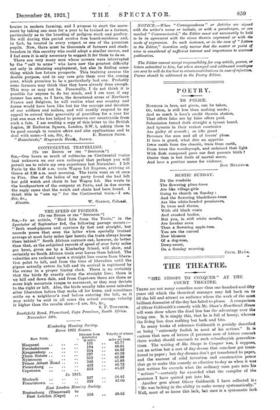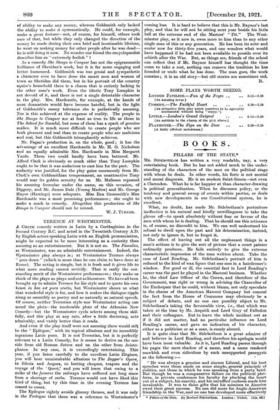THE THEATRES
"SHE STOOPS TO CONQUER" AT THE COURT THEATRE.
THERE are not many comedies more than one-hundred-and-fifty years old which the theatrical manager may fall back on to fill the bill and attract an audience whom the work of the mod brilliant dramatist of the day has failed to please. A comparison of Oliver Goldsmith's comedy with Mr. Shaw's Heartbreak House will soon show where the dead lion has the advantage over the living one. It is simply this, that he is full of honey, whereas the living lion does nothing but bark and bite. In many books of reference Goldsmith is genially described as being " extremely foolish in most of his actions." It is curious that men of letters (I presume men of letters concoct these works) should succumb to such schoolboyish generaliza- tions. The writing of She Stoops to Conquer was, I suppose, not an action but a sort of day-dream that somehow got trans- ferred to paper ; but day-dreams don't get transferred to paper, and the amount of solid invention and constructive power that go to make this comedy as effective to-day as when it was first written far exceeds what the ordinary man puts into his " actions "—certainly far exceeded what the compiler of the sentence I have quoted put into his. Another gem about Oliver Goldsmith I have collected is s " He was lacking in the ability to make money systematically." Well, most of us know this lack, but ours is a systematic lack of ability to make any money, whereas Goldsmith only lacked the ability to make it systematically. He could, for example, make a great fortune—not, of course, for himself, others took care of that, but while they only changed the direction of the money he made dining their own brief and inestimable lifetime, he went on making money for other people after he was dead— he is still doing it now. No wonder our friend the encyclopaedist describes him as " extremely foolish " I
As a comedy She Stoops to Conquer has not the epigrammatio brilliance of Sheridan's work, but it is far more engaging and better humoured. Goldsmith was too genial and sympathetic a character ever to have done the smart men and women of town as Sheridan did them, but in his portrait of the country squire's household there is a charm that is entirely lacking in the other man's work. Even the idiotic Tony Lumpkin is not devoid of it, and there is not a single detestable character in the play. Mrs. Hardcastle, for example, at the hands of most dramatists would have become hateful, but in the light of Goldsmith's sunny tolerance she is pathetically amusing. Nor is this achieved at the expense of reality. The people in She Stoops to Conquer are at least as true to life as those in The School for Scandal, but none of them has a spark of genuine malice. It is much more difficult to create people who are both pleasant and real than to create people who are malicious and real, but this Goldsmith triumphantly achieves.
Mr. Fagan's production is, on the whole, good ; it has the advantage of an excellent Hardcastle in Mr. H. 0. Nicholson and an equally admirable Mrs. Hardcastle in Miss Margaret Yarde. These two could hardly have been bettered. Mr. Alfred Clark is obviously so much older than Tony Lumpkin ought to be that it was audacious to cast him for the part. The audacity was justified, for the play gains enormously from Mr. Clark's own Goldsmithian temperament, an unattractive Tony would mar its golden serenity for us. Mr. Malleson repeated his amusing formulae under the name, on this occasion, of Diggory, and Mr. James Dale (Young Marlow) and Mr. George Hayes (Hastings) were adequate. Arms Ena Grossmith's Miss Hardcastle was a most promising performance ; she ought to make a mark in comedy. Altogether this production of She Stoops to Conquer should not be missed.
W. J. TURNER.



































 Previous page
Previous page